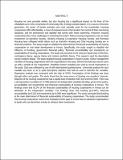| dc.description.abstract | Housing not only provides shelter, but also housing has a significant impact on the lives of the inhabitants as it is the cornerstone of community life, it brings societal esteem, it is a source of income generation, the center of family activities and most valuable asset for the households. Housing cooperatives offer affordability, a sense of empowerment in that resident has control of their own living situations, and the permanence and stability that comes with home ownership. However, housing cooperatives face many challenges in achieving this dream. Many housing cooperatives such as Posta Investment Co-operative Society, Ukulima Housing Co-operative Housing Society, and Romokia Housing have collapsed while others such as Kamuthi Housing and Chai Housing Society are in financial problems. The study sought to establish the determinants of financial sustainability of housing cooperatives in real estate development in Kenya. Specifically, the study sought to establish the influence of funding, government financial policy, financial accountability and investments on sustainability of housing cooperatives. The study was anchored in the resource-based view of the firm, contingency theory, agency theory and modern portfolio theory. This research used the descriptive survey research design. The study targeted housing cooperatives in Nyeri County. Senior management members of housing cooperatives were the respondents in the study. Slovins formula was used to come up with a sample of 152 respondents. Stratified random sampling was used to recruit respondents in the study. Data was collected by use of self-administered questionnaires. Univariate analysis for each variable was done so as to yield descriptive statistics that will be used to describe the variables. Regression analysis was conducted with the help of SPSS. Presentation of the findings was done through tables and graphs. The study found that the main source of funding was members’ deposits. Majority of the housing cooperatives had a capital base of between KES 1M and KES 50M. There was a strong positive correlation (r=0.796) between the independent variables (funding, government policy, accountability and investments) and financial sustainability of housing cooperatives in Kenya. The findings show that 63.3% of the financial sustainability of housing cooperatives in Kenya can be attributed to the independent variables. The findings show that funding (p=0.007), financial accountability (p=0.02) and investments (p=0.000) were significant. The study concluded that funding is the main determinant of financial sustainability of housing cooperatives. The study recommended that housing cooperatives review their strategies and fix gaps to ensure that are attractive organizations to banks who can lend them monies to enhance their investments. | en_US |

